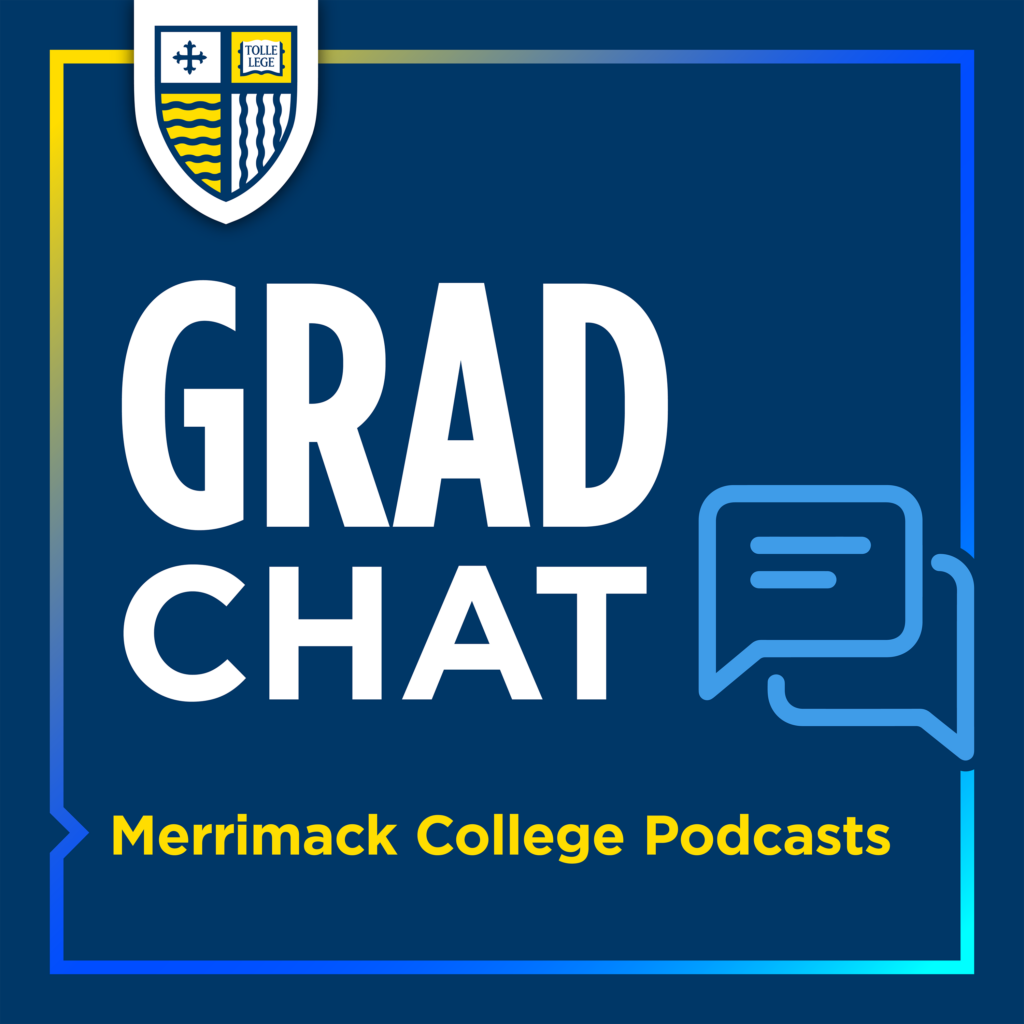Apply by Friday, August 15 to start classes this September! Start your no fee application today.
M.Ed. in English as a Second Language (PreK-6)
Make a difference in the lives of families in your community with an M.Ed. in ESL.
M.Ed. in English as a Second Language (PreK-6)
Our 36-credit M.Ed. in English as a Second Language program prepares you for your Initial license to serve linguistically and culturally diverse students in PreK–6 classrooms.
In addition to completing challenging and engaging coursework, students gain real-world teaching skills through a full-time practicum (student teaching) experience in early childhood classrooms.
Quick Facts:
- Earn your Initial license
- Online or on-campus course options
- Complete full time or part time
- Meets DESE licensure requirements
- Six starts per year
- Tuition under $23,000
- Tuition-free fellowship opportunities
- School district partnership discounts
- No GRE or GMAT required
- Financial aid eligible
Learn more about Merrimack’s M.Ed. in English as a Second Language.
Flexible Program Format
Designed for full-time teachers or career changers, the program can be completed in 13 months full time or 2–3 years part time.
Additionally, you can choose whether to learn online or come to campus for each course.
Meet the Requirements for Initial Licensure
This program is approved by the Department of Elementary and Secondary Education (DESE) as an Educator Preparation Program, including the required Sheltered English Instruction endorsement (SEI).
MTEL prep support is built into your master’s degree.
We’ll meet with you 1:1 to determine your specific licensing needs.
Field-Based Experiences Near You
You’ll have the opportunity to learn in the classroom through three pre-practicums (classroom observation) experiences and a full practicum (full-time student teaching) comprising 450 hours, which is the equivalent of 15 weeks.
You’ll work with a mentor for personalized support throughout the practicum.
Field-based experiences are arranged at conveniently located schools in Massachusetts, close to home.

Flexible Learning:
Choose Online or On-Campus for Each Course
Our flexible format allows you to register for your courses either online, on-campus, or a combination during each semester. Simply select your preference when registering courses and enjoy a convenient learning experience. International students may participate, but they must complete 50 percent of their courses on campus and cannot begin or end their program online.
As a bonus, full-time students who are U.S. citizens and who complete more than 50 percent of their courses on campus are eligible for health insurance.
Tuition-Free Teacher Education Fellowship
Graduate in 13 Months, Tuition-Free
As a K–12 teacher fellow, you’ll work in a partner school district for a full academic year, gaining essential field experience. You’ll engage in a range of classroom-based activities, including small group instruction, co-teaching, and ultimately, independent classroom instruction.
Fellows graduate in 13 months, tuition-free, and earn a Master of Education in Teacher Education and initial licensure in their area of specialization.
Cohort Model
K–12 fellows follow the same academic plan and must begin their studies in the Summer 1 term. Fellows take four courses online during the summer (two per eight-week term) and two courses on campus in the evenings during the fall and spring terms (one per eight-week term).
Fellowship Placement
Each fellow completes a full-time, nine-month placement at a school district in the area in which the student is seeking licensure. Most district placements are in the Merrimack Valley area, but we do have distance fellowships throughout Massachusetts.
Fellowship Application Process
The priority application is due January 9 to begin in May (Summer 1 term). Students complete the online application and submit an additional essay. Students interview for placements in January and February and receive fellowship decisions in March, with matches continuing until all slots are filled. After January 9, we accept fellowship applications on a rolling basis.
M.Ed. in English as a Second Language Coursework
To earn your M.Ed. in English as a Second Language, you will complete nine courses, including your practicum, for a total of 36 credit hours. Classes are eight weeks long and self-paced for your convenience. The practicum field experience is a full semester of 15 weeks, comprising 450 hours.
MTEL Requirements for Initial License in English as a Second Language:
- Communications & Literacy Skills (01): Reading and Writing subtests
- English as a Second Language (54)
Teaching Reading and Writing Skills to English Language Learners (four credits) students will gain an understanding of the relevant theories and practices for developing full literacy in English that is consistent with the kindergarten-grade six standards in the ELA Curriculum Framework. Reading instruction includes skills and strategies for success with phonemic awareness, phonics, vocabulary, fluency, and comprehension. Students will learn the best practices for teaching these dimensions of reading. They will also learn multiple approaches to teaching formal writing. In both areas, strategies to teach these skills to ELLs will be addressed. Attention will also be given to the study of grammar and the uses of English which are often difficult for ELLs. The course will include formal and informal measures for assessing ELLs’ reading comprehension and writing in narrative and informational genres. Field experience may be required.
In this course, students will learn and apply teaching strategies that support ELL’s linguistic and academic development in science, mathematics, and social studies. They will also learn how to plan and execute content-based lessons in kindergarten-grade six classrooms. The course will address the development of ELLs’ academic vocabulary and language skills, application of academic content knowledge, and higher order thinking skills. Lesson planning, implementation, and assessment occur within the sheltered content instructional model, providing extensive scaffolding strategies for comprehension and proficiency. Field experience may be required.
Co-requisite (0 credits): EDU 6507 – Pre-Practicum Field-Based Experience III
Children from many cultures, speaking many languages, now enter classrooms each year. Culturally and linguistically diverse children seek to find themselves in the literature they read. They and their first language classmates broaden their background knowledge, develop cultural awareness, and explore the values and traditions of each other’s cultures through reading multicultural literature. This course introduces students to children’s literature from non-western countries, literature about relationships between cultural groups, and literature written by members of other cultures that represent the unique experience of the people of that culture. Students will also learn how to select multicultural literature and teach it in culturally or linguistically diverse classrooms. Finally, they will learn to evaluate works of children’s literature that exemplify excellence, from cultural and traditional perspectives.
Students will participate in seminar discussions centering on issues and challenges in the evolving field of ESL Education. Topics will include current trends in teacher preparation, evaluation, co-teaching models, assessment, updated state and federal laws and regulations, and social justice issues.
This course will introduce students to the Professional Standards for Teaching (PST) and Licensure Preparation. Students will complete a pre-practicum experience (15 hours) in which they will observe a veteran teacher demonstrating the elements of the PST’s as well as the basic theories of child development and how students learn. The course will present the basic components of unit and lesson planning using Understanding by Design (UbD). Students will learn techniques around differentiating instruction, including tiered instruction, scaffolds to accommodate differences in learning styles, needs, interests, and levels of readiness of students. Students will examine specific systematic behaviors teachers use to create orderly, cooperative, and motivating learning environments that promote student achievement. The course will familiarize students with state and federal regulations regarding students with disabilities. Students will examine their own cultural competence and develop strategies that promote culturally responsive, inclusive classrooms. Co-requisite (0 credits):
Co-requisite (0 credits): EDU 6500 – Pre-Practicum Field-Based Experience
The course provides an overview of the emergence of language and literacy in typical development as well as issues that may arise with the existence of language-based disabilities. Challenges for English Language Learners will also be addressed. Significant theories related to language development in childhood will be reviewed, as well as the topic of Augmentative and Alternative Communication (AAC).
This foundational course in the graduate teacher education program for English as Second Language provides an overview of the state and federal laws pertaining to the education of English language learners as well as the background, history and philosophies surrounding instruction. The role of community, families and schools in English language learner education will also be explored.
This is the practicum required for licensure.
Co-requisite (0 credits): EDU 6510 – Practicum Seminar
What Our Students Say

Tune Into the Grad Chat Podcast
Check out a recent episode of the Grad Chat podcast and hear from a current M.Ed. student about their experience in the program.
Tune Into PodcastTuition and Financial Aid
M.Ed. in English as a Second Language
$620
per credit*
36
credits
$22,320
tuition
*Tuition based on 2025–2026 academic year.
Tuition and fees are subject to change annually.
Additional program fees may apply.
Financial Aid
As a graduate student, you may qualify for federal support in the form of loans. We strongly encourage all eligible* graduate students to apply for federal financial aid, even if they don’t demonstrate an exceptional financial need.
All graduate students also have the option of obtaining private loans and/or enrolling in an institutional payment plan.
Complete the Free Application for Federal Student Aid (FAFSA).
Merrimack College’s FAFSA school code is 002120.
*Certificate programs do not qualify for federal financial aid.
Partnership Discounts and Employer Tuition Assistance
Merrimack partners with many school districts across Massachusetts to offer 10 percent off your tuition. Contact us to see if your school district is a Merrimack partner. We also accept employer financial/tuition assistance.
Alumni Discount
Double Warrior Scholarships are available to all Merrimack graduates. New alumni automatically receive a 33 percent savings on tuition if they begin a graduate degree program within two terms following graduation. All other alumni (i.e., those with an earlier graduation date) are eligible for a tuition discount of 25 percent.
It’s Easy to Apply Online
A complete application includes:
- Online application (no fee)
- Official college transcripts from all institutions attended
- Resume or LinkedIn profile
- Personal statement
GRE and GMAT scores are not required. Additional materials may be requested.
Key Dates and Deadlines
This program enrolls six times a year. Each term is eight weeks.
Merrimack College
Accolades and Accreditation
At Merrimack College, we’re proud of our long history of providing quality degrees to students entering the job market. Our faculty are more than just teachers. We are committed to helping you grow — academically, personally and spiritually — so that you may graduate as a confident, well-prepared citizen of the world.
U.S. News & World Report | Best Regional Universities North (2025)
- Most Innovative Schools (No. 5)
- Regional Universities North (No. 39)
- Best Undergraduate Teaching (No. 19)
- Best Undergraduate Engineering Programs (No. 94)
(at schools where doctorate not offered) - Best Colleges for Veterans (No. 15)
- Best Value Schools (No. 51)
NECHE-Accredited
- Merrimack College is accredited by the New England Commission of Higher Education (NECHE).
Tell me more about Merrimack’s programs.